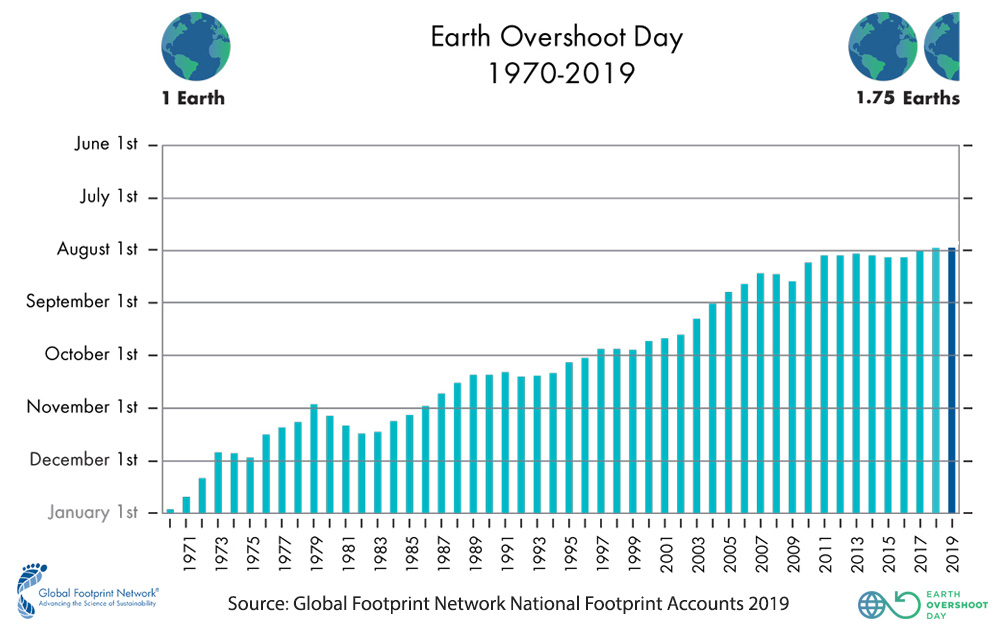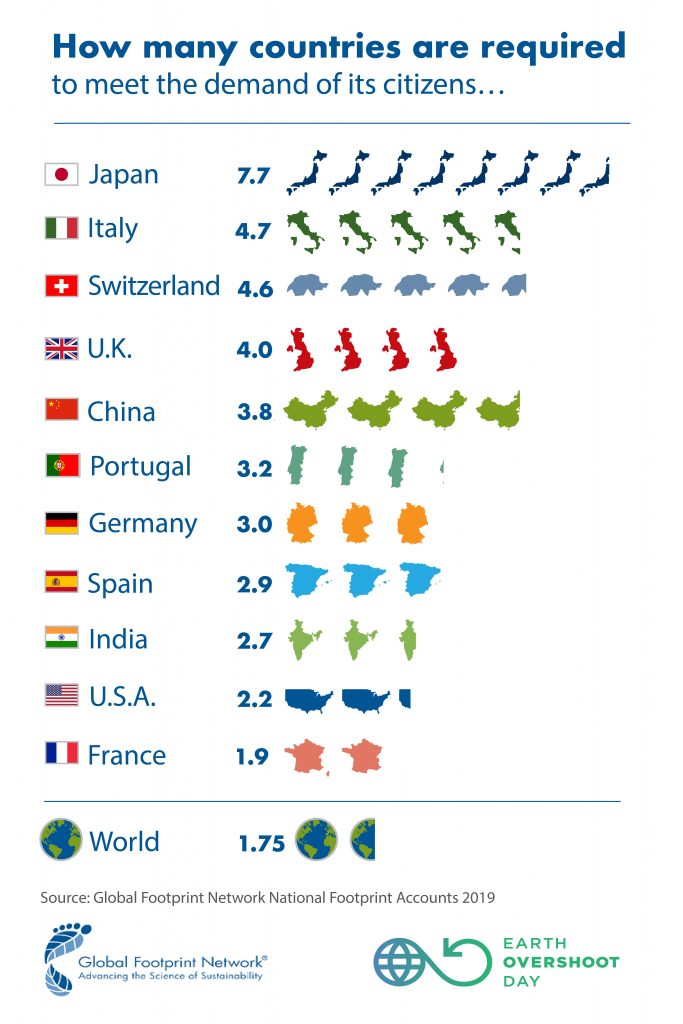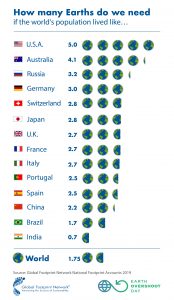Available in additional languages
OAKLAND, CA, USA — JULY 23, 2019 — On July 29, humanity will have used nature’s resource budget for the entire year, according to Global Footprint Network, an international sustainability organization that has pioneered the Ecological Footprint. It is Earth Overshoot Day. Its date has moved up two months over the past 20 years to the 29th of July this year, the earliest date ever.
Earth Overshoot Day falling on July 29th means that humanity is currently using nature 1.75 times faster than our planet’s ecosystems can regenerate. This is akin to using 1.75 Earths. Overshoot is possible because we are depleting our natural capital – which compromises humanity’s future resource security. The costs of this global ecological overspending are becoming increasingly evident in the form of deforestation, soil erosion, biodiversity loss, or the buildup of carbon dioxide in the atmosphere. The latter leads to climate change and more frequent extreme weather events.
“We have only got one Earth – this is the ultimately defining context for human existence. We can’t use 1.75 without destructive consequences,” said Mathis Wackernagel, co-inventor of Ecological Footprint accounting and founder of Global Footprint Network.
His just released book, Ecological Footprint: Managing Our Biocapacity Budget, demonstrates that overshoot can only be temporary. Humanity will eventually have to operate within the means of Earth’s ecological resources, whether that balance is restored by disaster or by design. “Companies and countries that understand and manage the reality of operating in a one-planet context are in a far better position to navigate the challenges of the 21st century,” Wackernagel writes.
Accelerate solutions to #MoveTheDate
Moving the date of Earth Overshoot Day back 5 days each year would allow humanity to reach one-planet compatibility before 2050. Solutions that #MoveTheDate are available and financially advantageous. Significant opportunities are to be found in five key areas: cities, energy, food, population, and planet. For instance, cutting CO2 emissions from fossil fuel burning by 50% would #MoveTheDate by 93 days.
Christiana Figueres, the former Executive Secretary of the United Nations Framework Convention on Climate Change (UNFCCC), Bertrand Piccard, founder of the Solar Impulse Foundation, and Sandrine Dixson-Declѐve, co-president of the Club of Rome, are among those who took to Twitter in recent weeks, calling to #MoveTheDate in video statements. Shoot your own statement.
Just days ahead of Earth Overshoot Day, Global Footprint Network launched the beta version of the #MoveTheDate Solutions Map where people are invited to champion existing solutions. Users can also connect with each other on the basis of geography and focus of interest, accelerating the implementation of new projects in the real world. Developed with startup Mapotic, the social platform also features solutions identified by partners, starting with Buckminster Fuller Institute award laureates.
The #MoveTheDate Solutions Map is designed to complement the Footprint Calculator. The latter, which enables people to calculate their own Ecological Footprint and their personal Earth Overshoot Day, draws more than 2.5 million users per year and is now available in eight languages, with Chinese and Portuguese most recently added.
The relevance of one-planet compatibility for successful business strategies is explored in a whitepaper by Schneider Electric and Global Footprint Network that was published July 22. Follow the twitter discussion via #SEMoveTheDate. Previous research by both organizations shows that if 100% of the existing building and industry infrastructure were equipped with available energy efficiency and renewable energy technologies from Schneider Electric and partners, the date of Earth Overshoot Day would move back by 21 days at least.
Additional resources
- Whitepaper www.schneider-electric.com/en/download/document/one_planet_prosperity
- #MoveTheDate Solutions Map movethedate.overshootday.org
- Earth Overshoot Day www.overshootday.org
- Infographics www.overshootday.org/newsroom/infographics/
- Ecological Footprint: Managing our Biocapacity Budget (book) www.footprintnetwork.org/2019/07/22/ecological-footprint-book
- Footprint Calculator www.footprintcalculator.org
- Footprint Data for countries data.footprintnetwork.org
- Business-focused press release www.overshootday.org/content/uploads/2019/07/SE_EarthOvershootDay2019_0722_PR_en.pdf
- June press release www.overshootday.org/newsroom/press-release-june-2019-english/
About the Ecological Footprint
The Ecological Footprint is the most comprehensive biological resource accounting metric available. It adds up all of people’s competing demands for biologically productive areas – food, timber, fibers, carbon sequestration, and accommodation of infrastructure. Currently, carbon emissions from burning fossil fuel make up 60 percent of humanity’s Ecological Footprint.
The book “Ecological Footprint: Managing Our Biocapacity Budget,” available in September, provides an in-depth introduction, drawing on the Footprint’s 30-year experience fighting ecological bankruptcy with robust resource accounting. Excerpts available for publication.
About Global Footprint Network
Global Footprint Network is an international sustainability organization that is helping the world live within the Earth’s means and respond to climate change. Since 2003 we’ve engaged with more than 50 countries, 30 cities, and 70 global partners to deliver scientific insights that have driven high-impact policy and investment decisions. Together, we’re creating a future where all of us can thrive within the limits of our one planet.
www.footprintnetwork.org





